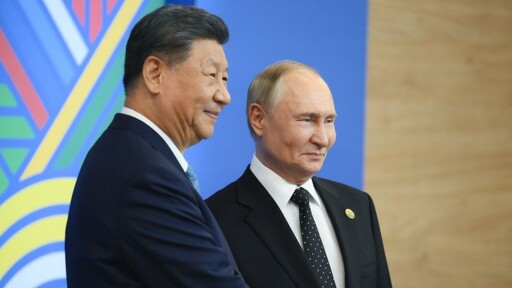Some in Washington see Moscow as a “junior partner” to be drawn away from Beijing’s orbit and into its own
It’s just projection as usual from the west.
Western experts often speak about Russia becoming China’s ‘junior partner’ and even a ‘vassal state’. This narrative has dominated nearly all Western discussions about Russia-China relations for a long time.
[…]
Another popular argument in favor of this theory is the difference in the size of the population and economy of the two countries (China’s population is ten times larger than that of Russia, and the same goes for its economy). While this is true in terms of statistics, reducing the complexities of interstate relations to mere statistics is either foolish or a deliberate oversimplification. Firstly, Russia maintains a decisive advantage in other areas, such as military-strategic potential
[…]
US President Donald Trump’s recent attempts to normalize relations with Moscow are interpreted as an effort to replicate the ‘Nixon effect’, but in reverse. In the early 1970s, then-President Richard Nixon’s visit to China strengthened US-China relations amid their shared opposition to the Soviet Union. Now, it is believed that American diplomacy could lure Russia away from China, enabling the US to deliver a strategic blow to China.
However, this comparison does not stand up to scrutiny. Firstly, during the 1970s, China and the USSR were already in a state of confrontation; Nixon’s actions didn’t cause this confrontation, but he capitalized on the favorable circumstances to open up the Chinese market for America and gain leverage in the struggle against the USSR. Today, neither Russia nor China wants to distance themselves from the US. If anyone is to blame for their closer alliance, it’s America itself – which has labeled them ‘existential adversaries’ and, out of arrogance and miscalculation, initiated a policy of ‘dual containment’.
Within this framework of dual containment, the US sees China as a far more dangerous rival and Russia as merely an ‘appendage’ that will align with either the US or China in the struggle for global dominance. However, this isn’t true; this perspective exists solely in the minds of the American elite.
[…]
The Chinese perspective
China sees the escalating tensions in the world and does not want to get involved in a bipolar confrontation – at least, that is China’s official stance. China considers America’s increasing obsession with containing it the result of “a Cold War mentality” and wonders why a profitable economic partnership, which has benefited both nations, should be jeopardized.
Unlike American politicians who believe that China might replace the US as the global leader, the Chinese have a more modest assessment of their own capabilities. They see the struggle for supremacy that unfolded between the Soviet Union and the United States as a cautionary tale. The USSR poured vast resources into this rivalry which, as many Chinese experts note, ultimately exhausted the nation, leading to a deep crisis and the collapse of the USSR.
China is determined not to repeat the USSR’s mistakes. Socio-economic development remains its top priority; foreign policy is considered a tool for advancing this development, but not an end in itself. China believes that expanding economic ties and increasing the significance of former colonies and semi-colonies will inevitably diminish the influence of former colonial powers, particularly the US.


Russia has economic dependence on China. Their focus are completely different. Because where Moscow and the core population is situated, Russian focus is European. China’s is in East Asia and Indo-Pacific. The two don’t invade each others space. This is different with US where it has military bases in Europe taking up defense of the European NATO countries effectively determining policy. An alliance between China and Russia would have Chinese military bases in Russia forwarded toward adversaries.